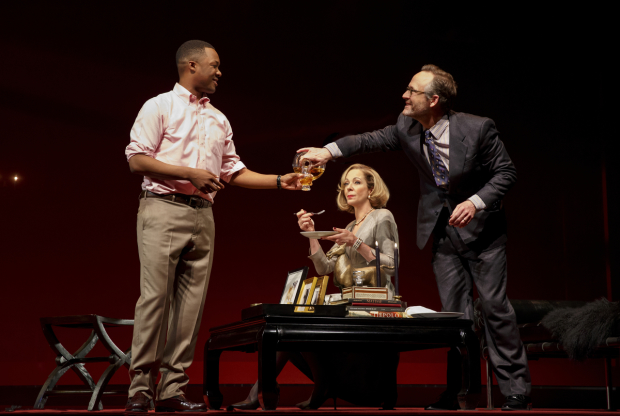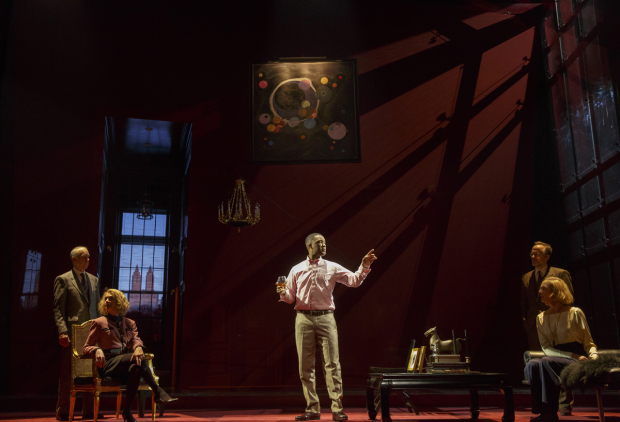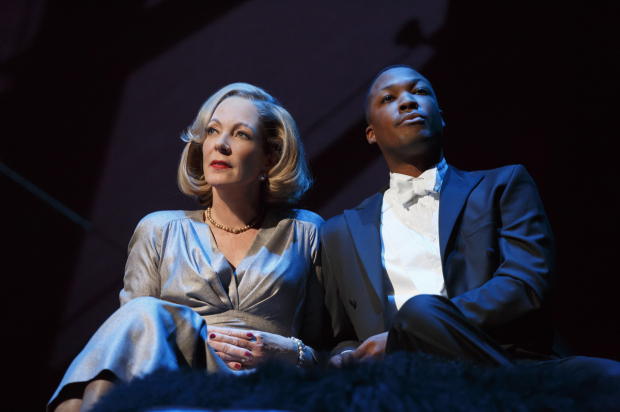Six Degrees of Separation

(© Joan Marcus)
Many things have changed in the 26 years since John Guare's Six Degrees of Separation made its Broadway debut — but the Upper East Side dinner party is not one of them. Somewhere, 21st-century versions of dissatisfied spouses Ouisa and Flan Kittredge are still hosting friends in their sprawling apartment where they brag about their Ivy League children, ogle their multimillion dollar paintings, and perhaps, as Ouisa does, yearn to capture the "experience" of life in something more than a series pithy anecdotes that we "spill out like human juke boxes" over glasses of expensive wine.
Of course, an anecdote is exactly what we're getting from our narrator Ouisa, played to perfection by Allison Janney. She's one of the only actors who could follow in the footsteps of original Ouisa, Stockard Channing (whose performance was immortalized in the 1993 film), offering the same combination of command, vulnerability, and wry wit. Directed with laser precision by Trip Cullman, the whole production is shaped like one large, sparsely detailed anecdote. Mark Wendland has even designed the Kittredges' fancy dwellings like a story that's been boiled down to its flashiest highlights — a bright-red carpet and scrim centered around a few pieces of furniture and a two-sided Kandinsky painting that's been paused on its more contained, geometric side (Ben Stanton and Lucy Mackinnon add creative lighting and projections, respectively).
It's in this frozen moment that Ouisa wisps us through the story of Paul in 90 minutes: There they are, entertaining their rich friend Geoffrey (Michael Siberry) — and soliciting a potential $2 million investment from him for a Cézanne painting that art dealer Flan (a perfectly repressed John Benjamin Hickey) has his eye on. Suddenly, a handsome young man named Paul comes stumbling into Ouisa and Flan's apartment looking for help. Bleeding, he claims to have been violently robbed and now needs a place to stay for the night. If you're thinking "stranger danger," don't worry. Paul explains that not only does he attend Harvard with two of their kids, he's the son of famous actor Sydney Poitier, who may even be able to land the couple roles in a movie adaptation of Cats (a satisfying roast of the infamous musical ensues).

(© Joan Marcus)
It's not much of a spoiler to say that none of this turns out to be true. But Corey Hawkins, whose performance sparks with charisma and intellectual hyperactivity, could sell the tale to Sidney Poitier and Andrew Lloyd Webber at the same cocktail party. Never shedding his winsome smile, Paul's delusional tale leads him into a very astute monologue about The Catcher in the Rye and its phony-averse protagonist Holden Caulfield. With all the lies Paul spouts, he would seem to be he biggest phony of all. But perhaps it's just the work of the imagination — our underutilized, uniquely human trait that may be the key to accessing life's most unreachable truths.
It could also be a bunch of hooey recited by a talented con man — an interpretation that seems all the more likely when the Kittredges catch their humble visitor in their guest room with a hustler (a fearless James Cusati-Moyer, who makes a brief but unforgettable cameo). Still, it's not hard to see why Ouisa is so mesmerized by Paul and vice versa. This mutual fascination eventually grows to love, though as it's portrayed by Janney and Hawkins, this love never feels personal per se. The connection between them remains grounded in the worlds they represent to each other, and Paul shows Ouisa just how small hers is. She lives life in a bubble of wealth, disconnected from the people outside of it and only superficially connected to the ones inside of it. It's a world surrounded by art, and yet completely colorless — a world where people are only six humans removed from one another, and still desperately lonely.

(© Joan Marcus)
It may even be a world audiences are more familiar with now than they were in 1990. Thanks to our trend toward isolation and the shrinking of our anecdotes to 140 characters or less, Six Degrees of Separation feels made for today, even in the absence of smart phones to bring the story into the technologically advanced present. In some ways, Guare predicted the future via the story's Ivy League progeny: The Kittredges' Harvard kids Woody and Tess (Keenan Jolliff, Colby Minifie); their classmate Ben (Ned Riseley), who is the son of Ouisa and Flan's equally Waspy friends Kitty (Lisa Emery) and Larkin (Michael Countryman); and Doug (Cody Kostro), a Dartmouth man and son of Dr. Fine (Ned Eisenberg), who also gets duped by Paul Poitier.
The young adults of Six Degrees are like portentous omens of the next generation's (i.e. today's) disconnected elite, which Cullman stares down with hilarious absurdity. As each of their parents get sucked into Paul's fabricated world, the kids tear them apart limb by limb with their pseudo-intellectual nonsense, Jolliff delivering a particularly extraordinary meltdown over a pink shirt of his that was lent to Paul.
By the end, they all have plenty of tragic anecdotes to share with their respective therapists. However, analyzing yourself as you would a painting won't get you any closer to understanding the actual experience of being human. Ironically, as we ponder these ideas, we're sitting in a theater analyzing another form of art, so maybe we're all being played for intellectual fools. Either way, collectively searching for meaning in a room filled with strangers (with whom we probably share less than a six-degree connection) isn't a bad place to start.











